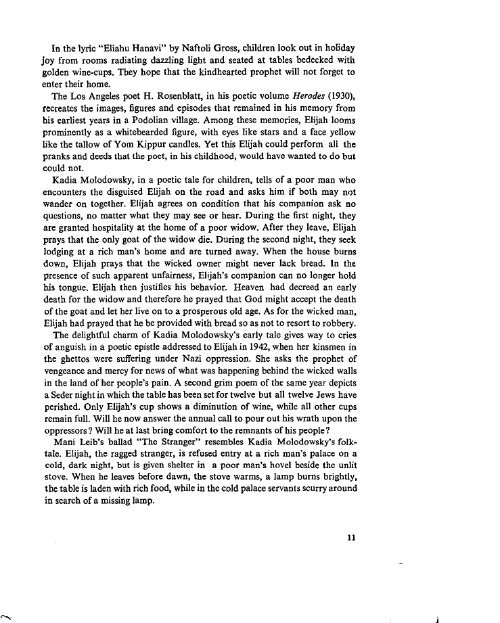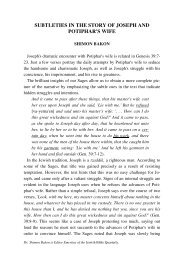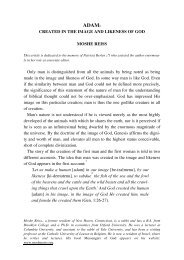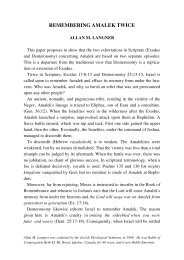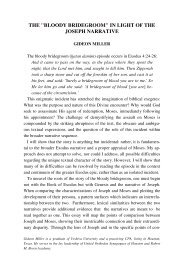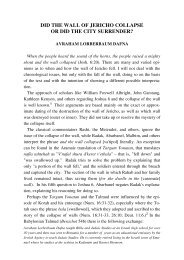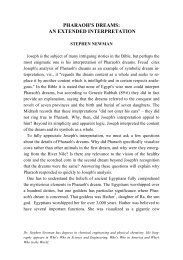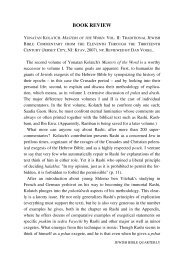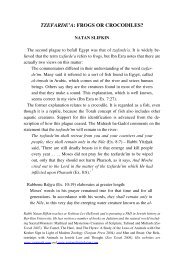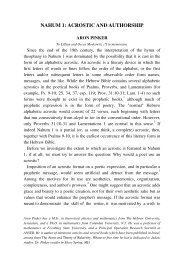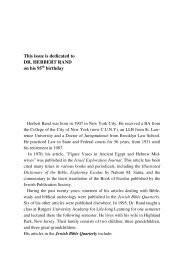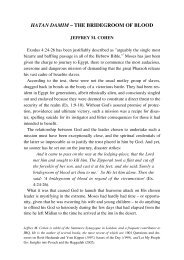ELUAH IN YIDDISH LITERATURE - Jewish Bible Quarterly
ELUAH IN YIDDISH LITERATURE - Jewish Bible Quarterly
ELUAH IN YIDDISH LITERATURE - Jewish Bible Quarterly
You also want an ePaper? Increase the reach of your titles
YUMPU automatically turns print PDFs into web optimized ePapers that Google loves.
In the lyric "Eliahu Hanavi" by Naftoli Gross, children look out in holiday<br />
joy from rooms radiating dazzling light and seated at tables bedecked with<br />
golden wine-cups. They hope that the kindhearted prophet will not forget to<br />
enter their home.<br />
The Los Angeles poet H. Rosenblatt, in his poetic volume Herodes (1930),<br />
recreates the images, figures and episodes that remained in his memory from<br />
his earliest years in a Podolian village. Among these memories, Elijah looms<br />
prominently as a whitebearded figure, with eyes like stars and a face yellow<br />
like the tallow of Yom Kippur candles. Yet this Elijah could perform all the<br />
pranks and deeds that the poet, in his childhood, would have wanted to do but<br />
could not.<br />
Kadia Molodowsky, in a poetic tale for children, tells of a poor man who<br />
encounters the disguised Elijah on the road and asks him if both may not<br />
wander on together. Elijah agrees on condition that his companion ask no<br />
questions, no matter what they may see or hear. During the first night, they<br />
are granted hospitality at the home of a poor widow. After they leave, Elijah<br />
prays that the only goat of the widow die. During the second night, they seek<br />
lodging at a rich man's home and are turned away. When the bouse burns<br />
down, Elijah pra)s that the wicked owner might never lack bread. In the<br />
presence of such apparent unfairness, Elijah's companion can no longer hold<br />
his tongue. Elijah then justifies his behavior. Heaven bad decreed an early<br />
death for the widow and therefore he prayed that God might accept the death<br />
of the goat and let her live on to a prosperous old age. As for the wicked man,<br />
Elijah had prayed that he be provided with bread so as not to resort to robbery.<br />
The delightful charm of Kadia Molodowsky's early tale gives way to cries<br />
of anguish in a poetic epistle addressed to Elijah in 1942, when her kinsmen in<br />
the ghettos were suffering under Nazi oppression. She asks the prophet of<br />
vengeance and mercy for news of what was happening behind the wicked walls<br />
in the land of her people's pain. A second grim poem of the same year depicts<br />
a Seder night in which the table has been set for twelve but all twelve Jews have<br />
perished. Only Elijah's cup shows a diminution of wine, while all other cups<br />
remain full. Will be now answer the annual call to pour out his wrath upon the<br />
oppressors? Will he at last bring comfort to the remnants of his people?<br />
Mani Leib's ballad "The Stranger" resembles Kadia Molodowsky's folktale.<br />
Elijah, the ragged stranger, is refused entry at a rich man's palace on a<br />
cold, dark night, but is given shelter in a poor man's hovel beside the unlit<br />
stove. When he leaves before dawn, the stove warms, a lamp burns brightly,<br />
the table is laden with rich food, while in the cold palace servants scurry around<br />
in search of a missing lamp.<br />
11


